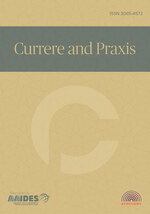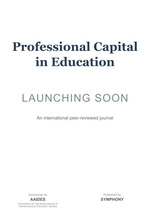Ex-colonialism: Toward collaborative change in curriculum studies
DOI:
https://doi.org/10.70116/2980274154Keywords:
Excolonialism, curriculum studies, reconciliation, indigenization, decolonizationAbstract
This article seeks to bring Australian-settler scholar Simone Bignall’s writing on ex-colonialism (exit-from-colonialism) into conversation with the field of curriculum studies. Specifically, ex-colonialism is discussed in relation to theories of social change in education and other frameworks for thinking about Indigenous and non-Indigenous curricular relations. Ex-colonialism posits a resolute exit from colonialism that doesn’t seek the recognition of the state and demands a complete overhaul of settler-colonial social structures. Coming from an intercultural position that includes a Eurocentric critique of Eurocentrism and mirroring an Indigenous politics of refusal from a settler-theorized position, ex-colonialism offers settlers some agency in enacting radical anti-colonial change. Structurally, the paper unfolds as follows. First, I present ex-colonialism in brief as an intercultural framework for working toward collaborative, anti-colonial change. I then characterize four other, more popular terms in curriculum studies that can be considered representative of larger Indigenous projects of social change: reconciliation, decolonization, Indigenization, and resurgence. Next, I compare each term to the project of social change proposed through ex-colonialism. I then highlight the history of BIPOC replacement in curriculum studies and public education, linking it to the consumptive nature of neoliberal capitalism. In response, I draw on ex-colonialism’s careful attention to the ethics of relation in order, ultimately, to suggest the micropolitical possibility of an otherwise to what has existed and what exists now in public schooling and curriculum.
Downloads
References
Adams, M. (2012). “Black vibes” and Africentric schools and institutions: Successful pedagogy for the African Nova Scotian learner. In D. E. Bernard & S. Brigham (Eds.), Theorizing Africentricity in action: Who we are is what we see (pp. 73-98). Fernwood.
Aguirre, K. (2024). Decolonization is also metaphorical: Indigenous feminist and queer-two-spirit storywork matters. In G. Starblanket (Ed.), Making space for Indigenous feminism: Third edition (pp. 286-310). Fernwood.
Ahenakew, C. R. (2017). Mapping and complicating conversations about Indigenous education. Diaspora, Indigenous, and Minority Education, 11(2), 80-91. https://doi.org/10.1080/15595692.2017.1278693 DOI: https://doi.org/10.1080/15595692.2017.1278693
Bascuñan, D., Sinke, M., Carroll, S. M., & Restoule, J.-P. (2022). Troubling trespass: Moving settler teachers toward decolonization. In S. Styres & A. Kempf (Eds.), Troubling truth and reconciliation in Canadian education: Critical perspectives (pp. 183-200). University of Alberta Press. DOI: https://doi.org/10.1515/9781772126198-013
Battiste, M. (2013). Decolonizing education: Nourishing the learning spirit. Purich.
Bignall, S. (2014). The collaborative struggle for excolonialism. Settler Colonial Studies, 4(4), 340-356. https://doi.org/10.1080/2201473X.2014.911651 DOI: https://doi.org/10.1080/2201473X.2014.911651
Bignall, S. (2022a). Colonial fascism: Redemption, forgiveness and excolonialism. In R. Dolphijn & R. Braidotti (Eds.), Deleuze and Guattari and Fascism (pp. 159-185). Edinburgh University Press. DOI: https://doi.org/10.1515/9781399505246-011
Bignall, S. (2022b). Colonial humanism, alter-humanism and ex-colonialism. In S. Herbrechter, I. Callus, M. Rossini, M. Grech, M. de Bruin-Molé, & C. J. Müller (Eds.) Palgrave Handbook of Critical Posthumanism (pp. 1–22). Palgrave Macmillan. DOI: https://doi.org/10.1007/978-3-030-42681-1_55-1
Bignall, S. (2023). Ex-colonialism. In R. Braidotti, E. Jones, & G. Klumbytė (Eds.), More Posthuman Glossary (pp. 49-52). Bloomsbury.
Braidotti, R. (2011). Nomadic subjects: Embodiment and sexual difference in contemporary feminist theory. Columbia University Press.
Braidotti, R. (2019). Posthuman knowledge. Polity. DOI: https://doi.org/10.5040/9798881811747
Brake, J. (2021). Ktaqmkuk. Maisonneuve. https://maisonneuve.org/article/2021/06/29/ktaqmkuk/
Brant, J. (2022). Recalling the spirit and intent of Indigenous literatures. In S. Styres & A. Kempf (Eds.), Troubling truth and reconciliation in Canadian education: Critical perspectives (pp. 223-245). University of Alberta Press. DOI: https://doi.org/10.1515/9781772126198-015
Brant, J. (2023). Confronting colonial violences in and out of the classroom: Advancing curricular moves toward justice through Indigenous Maternal Pedagogies. Curriculum Inquiry, 53(3), 244-267. https://doi.org/10.1080/03626784.2023.2200809 DOI: https://doi.org/10.1080/03626784.2023.2200809
Chambers, C. (1999). A topography for Canadian curriculum theory. Canadian Journal of Education, 24(2), 137-150. https://www.jstor.org/stable/1585924 DOI: https://doi.org/10.2307/1585924
Coulthard, G. S. (2014). Red skin, white masks: Rejecting the colonial politics of recognition. University of Minnesota Press. DOI: https://doi.org/10.5749/minnesota/9780816679645.001.0001
Deer, F. (2022). Discovering truth in the post-TRC era: Morality and spirituality discourses in reconciliatory journeys of schools. In S. Styres & A. Kempf (Eds.), Troubling truth and reconciliation in Canadian education: Critical perspectives (pp. 3-14). University of Alberta Press. DOI: https://doi.org/10.1515/9781772126198-004
Dei, G. J. S. (2022). Contested knowledges: Indigeneity, resistance, and Black theorizing in Academia. In S. Styres & A. Kempf (Eds.), Troubling truth and reconciliation in Canadian education: Critical perspectives (pp. 65-79). University of Alberta Press. DOI: https://doi.org/10.1515/9781772126198-007
Deleuze, G. (1990). Expressionism in philosophy: Spinoza (trans. M. Joughin). Princeton University Press.
Deleuze, G., & Guattari, F. (1987). A Thousand Plateaus: Capitalism and schizophrenia (Trans. B. Massumi). University of Minnesota Press.
Donald, D. (2009). Forts, curriculum, and Indigenous Métissage: Imagining decolonization of Aboriginal-Canadian relations in educational contexts. First Nations Perspectives, 2(1), 1-24.
Donald, D. (2016). From what does ethical relationality flow? An “Indian" Act in three artifacts. In J. Seidel & D. W. Jardine (Eds.), the ecological heart of teaching: radical tales of refuge and renewal for classrooms and communities (pp. 10-16). Peter Lang.
Ermine, W. (2007). The ethical space of engagement. Indigenous law journal, 6(1), 193-203.
Freire, P. (1996). Pedagogy of the oppressed (New rev. ed.). Penguin Books. DOI: https://doi.org/10.1007/978-1-349-25349-4_25
Gaudry, A., & Lorenz, D. (2018). Indigenization as inclusion, reconciliation, and decolonization: Navigating the different visions for indigenizing the Canadian Academy. AlterNative, 14(3), 218-227. https://doi.org/10.1177/1177180118785382 DOI: https://doi.org/10.1177/1177180118785382
George, R. Y. (2022). The performativity of reconciliation: Illusory justice and the Site C Dam. In S. Styres & A. Kempf (Eds.), Troubling truth and reconciliation in Canadian education: Critical perspectives (pp. 103-120). University of Alberta Press. DOI: https://doi.org/10.1515/9781772126198-009
Grafton, E., & Melançon, J. (2020). The dynamics of decolonization and indigenization in an era of academic ‘reconciliation’. In S. Cote-Meek & T. Moeke-Pickering (Eds.), Decolonizing and Indigenizing Education in Canada (pp. 135-153). Canadian Scholars’ Press.
Haig-Brown, C., & Green, H. (2022). Talking it through, talking through it: A dialogue on Indigenizing education. In S. Styres & A. Kempf (Eds.), Troubling truth and reconciliation in Canadian education: Critical perspectives (pp. 201-222). University of Alberta Press. DOI: https://doi.org/10.1515/9781772126198-014
Hanson, A. J. (2020). Literatures, communities, and learning: Conversations with Indigenous writers. Wilfrid Laurier Univ. Press. DOI: https://doi.org/10.51644/9781771124522
Howell, L., & Ng-A-Fook, N. (2023). Truth, and then reconciliation research: An emerging field of Educational Studies. In R. Coloma & J. Rhee (Eds.), International encyclopedia of education: Diversity, democracy, and social justice in education (pp. 272-282). Elsevier Canada. DOI: https://doi.org/10.1016/B978-0-12-818630-5.08034-9
Jardine, D. W., & Lyle, E. (2022). What, then, is our task?. Journal of Educational Thought/Revue de la Pensée Educative, 55(1), 31-42. https://doi.org/10.55016/ojs/jet.v55i1.75672 DOI: https://doi.org/10.55016/ojs/jet.v55i1.75672
Kempf, A., Styres, S., Brechbill, L., & El-Sherif, L. (2022). A troubling place to start: Reconciliation in collapse. In S. Styres & A. Kempf (Eds.), Troubling truth and reconciliation in Canadian education: Critical perspectives (pp. xv-xxv). University of Alberta Press. DOI: https://doi.org/10.1515/9781772126198-003
Koops, S. (2018). As long as the grass grows: walking, writing and singing treaty education. In E. Hasebe-Ludt & C. Leggo (Eds.), Canadian curriculum studies: A metissage of inspiration/imagination/intercosnnection (pp. 2-10). Canadian Scholars Press.
Kumar, A. (2013). Curriculum as meditative inquiry. Palgrave MacMillan. DOI: https://doi.org/10.1057/9781137315816
Kumar, A. (2019). Curriculum in international contexts: Understanding colonial, ideological and neoliberal influences. Palgrave Macmillan. DOI: https://doi.org/10.1007/978-3-030-01983-9
Lunney Borden, L. (2016). A Journey to transforming Mathematics education for Mi’kmaw students. In M. Battiste (Ed.), Visioning a Mi’kmaw Humanities: Indigenizing the academy (pp. 253-286). Cape Breton University Press.
May, T. (2006). Gilles Deleuze: an introduction. Cambridge University Press. DOI: https://doi.org/10.1017/CBO9781139165419
Miles, J. (2021). Curriculum reform in a culture of redress: How social and political pressures are shaping social studies curriculum in Canada. Journal of Curriculum Studies, 53(1), 47-64. https://doi.org/10.1080/00220272.2020.1822920 DOI: https://doi.org/10.1080/00220272.2020.1822920
Newhouse, D., & Quantick, R. (2022). Teaching Indigenous studies in a time of reconciliation: An anticolonial approach toward postcolonial awareness. In S. Styres & A. Kempf (Eds.), Troubling truth and reconciliation in Canadian education: Critical perspectives (pp. 247-280). University of Alberta Press. DOI: https://doi.org/10.1515/9781772126198-016
Nxumalo, F., & Tuck, E. (2023). Creating openings for co-theorizing. Qualitative Inquiry, 29(1), 137-146. https://doi.org/10.1177/10778004221095053 DOI: https://doi.org/10.1177/10778004221095053
Palmater, P. (2021, June). Canada, it’s time for land back. The Breach. https://breachmedia.ca/land-back/
Peters, N. (2016). Tales told in schools: Images of the Mi’kmaq in Nova Scotia school curriculum. In M. Battiste (Ed.), Visioning a Mi’kmaw Humanities: Indigenizing the academy (pp. 163-227). Cape Breton University Press.
Pidgeon, M. (2022). Indigenous resiliency, renewal, and resurgence in decolonizing canadian higher education. In S. Styres & A. Kempf (Eds.), Troubling truth and reconciliation in Canadian education: Critical perspectives (pp. 15-37). University of Alberta Press. DOI: https://doi.org/10.1515/9781772126198-005
Pinar, W. F., Reynolds, W. M., Slattery, P., & Taubman, P. M. (1995). Understanding Curriculum. Peter Lang.
Poitras Pratt, Y., & Bodnaresko, S. (Eds.). (2023). Truth and Reconciliation Through Education: Stories of Decolonizing Practices. Brush Education Inc. DOI: https://doi.org/10.22329/jtl.v17i1.7913
Rollo, T. (2022). Beyond Curricula: Colonial pedagogies in public schooling. In S. Styres & A. Kempf (Eds.), Troubling truth and reconciliation in Canadian education: Critical perspectives (pp. 121-138). University of Alberta Press. DOI: https://doi.org/10.1515/9781772126198-010
Sabzalian, L. (2018). Curricular standpoints and native feminist theories: why native feminist theories should matter to curriculum studies. Curriculum Inquiry, 48(3), 359-382. https://doi.org/10.1080/03626784.2018.1474710 DOI: https://doi.org/10.1080/03626784.2018.1474710
Schubert, W. H. (1986). Curriculum: Perspective, paradigm, and possibility. Macmillan Publishing Company.
Simpson, A. (2007). On ethnographic refusal: Indigeneity, ‘voice’ and colonial citizenship. Junctures: the journal for thematic dialogue, 9, 67-80. https://junctures.org/junctures/index.php/junctures/article/view/66
Simpson, L. (2011). Dancing on our turtle's back: Stories of nishnaabeg re-creation, resurgence and a new emergence. Arbeiter Ring Pub.
Simpson, L. (2014). Land as pedagogy: Nishnaabeg intelligence and rebellious transformation. Decolonization: Indigeneity, Education & Society, 3(3), 1-25. https://jps.library.utoronto.ca/index.php/des/article/view/22170
Simpson, L. (2017). As we have always done: Indigenous freedom through radical resistance. University of Minnesota Press. DOI: https://doi.org/10.5749/j.ctt1pwt77c
Stefanovich, O. (2024, June 3). 5 years after MMIWG inquiry's final report, former commissioners still waiting for progress. CBC News. https://www.cbc.ca/news/politics/national-inquiry-mmiwg-final-report-fifth-anniversary-1.7221433
Styres, S., & Kempf, A. (Eds.). (2022a). Troubling truth and reconciliation in Canadian education: Critical perspectives. University of Alberta Press.
Styres, S., & Kempf, A. (2022b). Reconciliation and relational ethics in education. In S. Styres & A. Kempf (Eds.), Troubling truth and reconciliation in Canadian education: Critical perspectives (pp. 141-159). University of Alberta Press. DOI: https://doi.org/10.1515/9781772126198
Todd, Z. (2016). An Indigenous feminist’s take on the ontological turn: “Ontology” is just another word for colonialism. Journal of Historical Sociology, 29(1), 4–22. https://doi.org/10.1111/johs.12124 DOI: https://doi.org/10.1111/johs.12124
Truth and Reconciliation Commission of Canada. (2015). Final report of the Truth and Reconciliation Commission of Canada. Volume one, Summary: Honouring the truth, reconciling for the future. James Lorimer & Company.
Tuck, E., & Gaztambide-Fernández, R. A. (2013). Curriculum, replacement, and settler futurity. Journal of Curriculum Theorizing, 29(1), 72-89. https://journal.jctonline.org/index.php/jct/article/view/411 DOI: https://doi.org/10.63997/jct.v29i1.411
Tuck, E., & Yang, K. W. (2012). Decolonization is not a metaphor. Decolonization: Indigeneity, education & society, 1(1), 1-40.
Varma-Joshi, M., Baker, C., & Tanaka, C. (2004). Names will never hurt me?. Harvard Educational Review, 74(2), 175-208. https://doi.org/10.17763/haer.74.2.p077712755767067 DOI: https://doi.org/10.17763/haer.74.2.p077712755767067
Weenie, A. (2024). You’ve been given a gift. In A. Weenie, W. Ermine, K. Lewis, I. Swan, M. Saskamoose, J. Cappo, & D. Pelletier (Authors), Cree Pedagogy: Dance Your Style (pp. 7-20). Canadian Scholars’ Press.
Wozolek, B. (2023). Educational necropolitics: A sonic ethnography of everyday racisms in US Schools. Routledge. DOI: https://doi.org/10.4324/9781003335245
Wynter, S. (2006). On how we mistook the map for the territory, and reimprisoned ourselves in our unbear-able wrongness of being, of desêtre: Black studies toward the human project. In L. R. Gordon & J. A. Gordon (Eds.), A companion to African-American studies (pp. 107–118). John Wiley & Sons, Ltd: DOI: http://dx.doi.org/10.1002/9780470996645.ch9 DOI: https://doi.org/10.1002/9780470996645.ch9
Zinga, D. (2022). Uncomfortable realities: Reconciliation in higher education. In S. Styres & A. Kempf (Eds.), Troubling truth and reconciliation in Canadian education: Critical perspectives (pp. 39-63). University of Alberta Press. DOI: https://doi.org/10.1515/9781772126198-006
Downloads
Published
How to Cite
Issue
Section
License
Copyright (c) 2025 Symphony

This work is licensed under a Creative Commons Attribution 4.0 International License.














